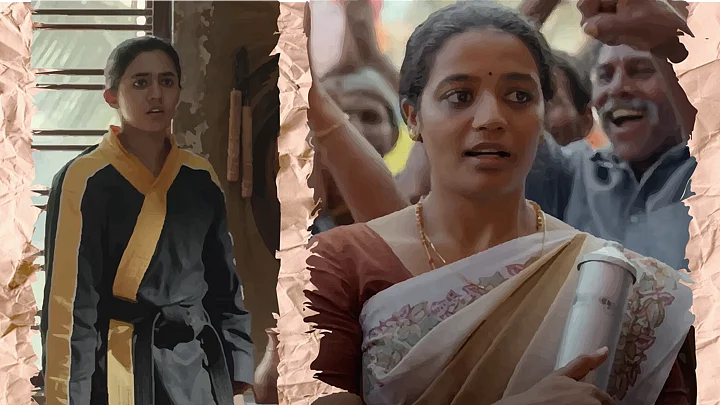Superhero films are notorious for being hypermasculine depictions of heroism. Basil Joseph's Minnal Murali was primarily focused on the two male leads- Tovino Thomas as Jaison and Guru Somasundaram as Shibu. Once the foreground is set aside, there is a lot to discuss about the women of Minnal Murali.
When it comes to the basics, Jaison and Shibu are both struck by lightning and develop magical powers, one embarks on the path of good and the other evil- though it is more nuanced than that.
One of the major female characters in the film is Femina George as 'Bruce Lee' Biji, a martial arts teacher and travel agent. Her story runs almost parallel to Jaison's- starting with the fact that his ex is marrying her ex and they both aren't taking it well.
She is even the person who actually saves the villagers from Shibu's final act as an antagonist even though Jaison is the one who defeats him.
Biji is famous throughout the town for her signature ‘kick’ and she even faces Jaison as Minnal Murali and essentially rushes into a life-threatening situation to save everyone with zero credit. One hopes that her contribution gets recognised but it's rare for women's contribution to be spotlighted, and this case was no different.
Another nuanced portrayal of a woman in a small town is Jaison's sister (Arya Salim), though it'd be good if her name was mentioned. She is in a toxic marriage and also supports her brother so he can fulfill his dreams, putting herself at risk. The archetype of a 'strong woman' has multiple shades and nuances.
While talking about her character Vidya Vincent in Sherni, Vidya Balan had said in an interview that her character is 'non-confrontational'.
She said, "So many women have written to me that it has resonated with them because not everyone is confrontational. A lot of times we choose our battles. We know where to speak up." This summarises Jaison's sister. Her defiance of her physically abusive husband is layered and not always direct.
He hits her just because Jaison ate more appam than he perhaps wanted him to? (Even though the way the scene was handled with comic undertones is irksome). Her response about not giving Jaison gold is rather tongue-in-cheek because well…it’s a lie. It's a secret between her and the audience.
Then there is Bincy- a grey character, perhaps because we see the story predominantly through Jaison's lens. Did she really trick him or did she just break up with someone she didn't want to be with? Either way, it was refreshing to see a female character who puts her needs first.
The woman that made me think the most, however, is someone who isn't even in the film- Shibu's mother. The only major information we get about her is Daasan telling Shibu he has the same 'mental illness that killed his mother'. It makes me wonder- is that really what happened or is that the version everyone is comfortable with?
Minnal Murali delves dangerously close to the stereotype of people with mental illness becoming aggressors but it also explores the way the majority treats Shibu as an outcast. Did the same thing happen to his mother? The film doesn't answer any of those questions but it makes you wonder.
Another major character in the film is Shelly Kishore as Usha. Usha's character is one that could've been built much better.
She represents the part of the female population who are backed against a corner by multiple arms of patriarchy- she had to leave an abusive marriage, her brother is ready to marry her off to an affluent man, the entire village sees her as merely a sexual object.
And yet, why isn't there more? When she represents such an important aspect of the film, why is her story retained to her suffering and little else? Usha is a woman with agency whose journey is ruined by the end.
And that's why I wouldn't argue that Minnal Murali is a feminist film. It wouldn't even pass the Bechdel test, which is already an inadequate and outdated parameter.
It has the framework for excellent female characters and builds them up expertly just to squander most of them for the sake of the 'superhero' plot.
The women, though all inspiring characters on their own, remain catalysts in the lives of Jaison and Shibu with some becoming collateral damage. Their portrayals seem to have a great vision but the execution is still stuck in the past- they are defined by their relationships with the men around them.
Minnal Murali was an enjoyable film as it stands but the women of the Basil Joseph directorial are memorable, in more ways than one, and they deserved better.
(At The Quint, we question everything. Play an active role in shaping our journalism by becoming a member today.)
